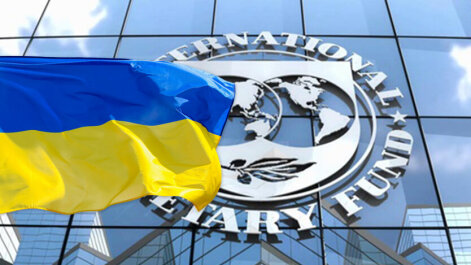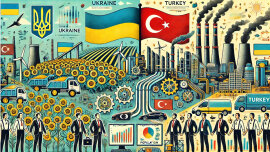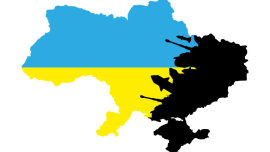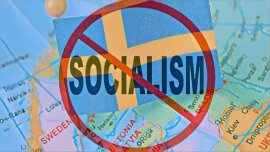At the end of June 2023 The International Monetary Fund (IMF) has published Country Report on Ukraine No. 23/248. In it, the Fund's experts assessed the development of the country's economy, the process of fulfilling the obligations assumed, and also formulated a forecast up to 2033. In the conditions of the war (no one knows how much more after it), complete uncertainty within the country, the pre-recessionary state of the EU and the world, making digital forecasts until 2033 is a clear manifestation of literary and statistical creativity. The figures in the report are an essay on a given topic. It sounds something like this: “What kind of Ukraine do we represent in 10 years”. The main conclusion from the economic essay from the IMF: “ Ukraine will remain a country of general state interventionism. She will be on a short debt leash EU-27/ G -7 , withnon-competitive tax system, unfavorable investment climate, dominance of large Ukrainian and international businesses .”
The version presented by the IMF inspires pessimism and a certain doom. The position of the Fund, which he could not agree with the Ukrainian authorities, is as follows.
First. The Ukrainian economy was and until 2033 will remain state-owned. In the hands of the VIP-managers of someone else's (politicians, officials, controllers, security officials) will not only command heights in the economy, but the main tools for controlling entry into the market, work on it and exit from it. Either the IMF is counting on a miracle - the magical transformation of Ukrainian officials into disinterested, all-knowing professional angels-managers, or it does not see a problem in the presence of such a low level of public administration.
After reaching an unprecedented level of government spending in 2022. at 66.0% of GDP, the Fund expects a similar result in 2023. - - 63.3% of GDP. There will be a little less in 2024. - 59.3%. In the situation of domination of state property, the model of the Ukrainian economy is close to military/post-war socialism. Proceeds from privatization up to 2028. are planned at the level of 0.1% of GDP, and then, until 2033, in the line of the base scenario "revenues from privatization" there is generally zero.
The IMF predicts a gradual decline in government spending as a share of GDP to 41% of GDP in 2033. This is almost as much as it was in 2021. (40.5% of GDP). No developing country in the world has ever achieved rapid, long-term economic growth with this size of state. Approximately with this size of the state, the average annual growth rate of the Ukrainian economy in 2012-20212. were minus 0.5% of GDP.
Second. The Ukrainian economy will remain slow for the next ten years, chronically lagging behind even the average EU standards. After falling real GDP by 29.1% in 2022. The IMF predicts growth of 2% in 2023. and by 3.2% in 2024. In 2025 there will be a short acceleration to 6.5% of GDP, and then eight years in a row the average annual growth rate of the Ukrainian economy for 8 years, until 2034. will be 4% of GDP. This is not much more than the average annual growth rate of the world economy. This is more than twice as slow as it takes to achieve the goal of one trillion dollars of GDP declared by President V. Zelensky. With such a speed, Ukraine will catch up with the current level of Romania and Poland for more than 30 years. Not surprising, because the Fund sees the main drivers of growth in public resources, projects and investments.
Third. Ukraine will remain a zone of investment drought. Domestic investment is sorely lacking. For external ones, security, strong legal institutions for the protection of property rights, and freedom of movement of capital are needed. There is none of that now. In the future, a gradual, pipette improvement in the investment climate is predicted. After a sharp decline in investment in fixed assets in 2022. by 13.9% of GDP in 2023. a slight increase of 2.6% is expected in 2024. another 1.2%. In 2025 investment will short-term accelerate to 4.2% in 2025, and then over the next eight years, the average annual investment growth rate will be a meager 0.7% of GDP.
The painful failure of foreign direct investment will continue until 2025. Their volume in 2023-2023. amounted to a meager 0.3% of GDP. In 2025 it will be 2.5% of GDP in 2026. – 4.8% of GDP, and then for seven years the average annual volume of FDI will be ~4.5% of GDP. No investment - no modernization, no economic growth. And yet there is no necessary growth rate of labor productivity, and, consequently, there are no grounds for raising wages and pensions.
Fourth. According to the IMF, Ukraine will remain an uncompetitive tax and regulatory jurisdiction for the next ten years. In 2023 the level of tax revenues is projected at 33.7% of GDP, in 2024. - 35.4% of GDP, in 2025. - 35.9% of GDP. For comparison in 2021. tax revenues amounted to 33.5% of GDP. Before the war, businesses complained about the high tax burden and burdensome tax administration.
A cold shower for business, for all those who count on an adequate tax policy, will be the IMF forecast for an increase in the tax burden. It will peak in 2028. - 38.2% of GDP. The total budget revenues this year will be 41.8% of GDP, and expenditures - 43.8% of GDP. The share of non-tax budget revenues remains very low despite the fact that the state remains the dominant owner in the economy.
The size of the State envisaged by the Fund is typical for an EU country with a high income level, high-quality institutions and a full-fledged market structure of the economy. There is nothing of this in Ukraine. In such a regime, the country is doomed to remain in a zone of very strong dependence on external creditors who will dictate the terms of economic policy in order to guarantee itself debt servicing. In essence, the IMF is proposing fiscal and fiscal policies that make it impossible for Ukraine to become a highly competitive economy.
We have already entered the zone of high-risk budget imbalance. After the government budget deficit in 2022. in 25% of GDP (excluding external grants) this figure in 2023. will get even worse. The deficit is projected at 25.8% of GDP in 2024. - 21.1% of GDP, in 2025. - 11.6% of GDP. Until 2034 The Fund does not predict a single year of a balanced state budget. Ukraine will remain on a short debt leash to the EU/G7 countries. They will impose an economic policy on us, build it into the programs / priorities of the EU, the UN, the WEF, that is, a policy that is essentially socialist. It is beneficial for ~3% of Ukrainians, VIP managers and consumers of someone else's. It is devastating for small businesses and large businesses.
Fifth. The public debt loop will shrink. Please note that in 2021 public and publicly guaranteed debt amounted to 50.5% of GDP. For 2022 it rose to 78.5% of GDP. In 2023, debt is projected to rise to 88.1% of GDP. In 2025 we will break through the ceiling of 100% of GDP debt. Then, a gradual reduction of the public debt to 75.2% of GDP in 2033 is envisaged. Such debt obligations for the Oligarchy/Schematosis, broken by the war and the system, are an unbearable burden.
Debt policy, as part of the country's fiscal and investment policy, is, in fact, a form of neo-colonialism. The beneficiaries are large international financial organizations, large banks, funds and insurance corporations, as well as all those who have the opportunity to “beat out” money from the governments of the G7 / EU-27 countries for international development projects. First, VIP-managers and consumers of foreign property drive the poor country into a debt trap, and then they say to proposals to reduce the tax burden: “You can’t, because you need to repay the debts that we together have hung on the country.”
Sixth. Ukraine will remain dominated by large Ukrainian banks and international financial institutions with low-quality monetary policy . The National Bank remains looking after their interests. With the help of the IMF, he secured the status of an independent body. Only in developed, free market countries this status is given to ensure price stability (0-2% inflation), and in Ukraine the NBU, in fact, protects the oligopoly of selected financial favorites, does not allow the creation of a full-fledged capital market, and prevents financial openness.
Monetary policy in Ukraine has not worked out for more than 30 years. Ignoring the basic monetary rule about the relationship between the amount of money in circulation and prices has become a toxic norm. Underestimation of the harm of inflation for the economy, investors and consumers remains. It would seem that the painful rise in inflation in 2022 should have taught me something. Alas. In 2022 with the economy falling by 29.1% of GDP, the monetary base grew by 19.6%, and the broad money supply (M3) by 20.8%. According to the IMF forecast, monetary expansion in 2023 will there will be even more. The monetary base will increase by 30.6%, and the broad monetary base (M3) by 29.7%. And this is despite the projected GDP growth of 1-3%. Such a number of hryvnias in the financial system, heavily clogged from the outside world, in the context of administrative regulation of the hryvnia exchange rate and an investment drought, this is an undisguised campaign to prepare for the devaluation of the hryvnia. After inflation in 2022 at 26.6%, another year of a devastating 15.5% inflation tax awaits us in 2023. In 2024, the IMF predicts a decrease in inflation to 10%. At the same time, the Fund does not predict the key parameter for assessing the feasibility of the macroeconomic forecast - the hryvnia exchange rate against the dollar. Either so as not to frighten, or so as not to disclose a deep insider even at the forecast level.
Such a decision will be made by a very narrow circle of insiders of the banking sector, the NBU and the Bank. Those people who play in government bonds will certainly make the necessary financial transactions in order to once again be on the right side of Ukrainian monetary policy, which is exclusively beneficial for themselves. Unfortunately, the IMF pays much more attention to the inadmissibility of maintaining the military regime of sole proprietorships in Ukraine, and not to the huge costs that the monetary policy of the National Bank generates for the country, businesses and the population. Thus, the Fund took the side of those who preserve the pre-war macroeconomic and institutional status quo. The same condition that turned Ukraine into the poorest country in Europe.
So, the International Monetary Fund finally decided. The course towards the conservation of the pre-war economy of Ukraine has been taken. Forget about a trillion dollar economy and creating the best investment/business climate in Europe and the world. Forget about the economics of innovative institutions to ensure development and growth of 7-10% for 20+ years. The IMF intends to do in Ukraine what it has done in more than 100 low-income countries. There is not a single example of a real economic miracle among them. International bureaucratic technocrats who manage other people's money have not been and will not be supporters of the free market and real capitalism.
The IMF has found partners within Ukraine. These are the leadership of the National Bank, the Cabinet of Ministers, the Ministry of Finance, the Ministry of Economy, the heads of the economic committees of the Verkhovna Rada, as well as the economic block of the President's Office. This is such a contradictory situation, to put it mildly. V. Zelensky delivers a clear and unambiguous order for the government and parliament: “We work for the sake of the Ukrainian axiom: freedom gives success. Tse those who change the most. Success. Tse those that are necessary for all our lands. To our people. To all parts of Ukraine, to all children of Ukraine…” But his entire economic environment, together with the IMF, has adopted and is pursuing an economic policy against the axiom of Zelensky’s success.
This conflict can be resolved in only one way - by changing the leaders of the economic team of Ukraine, by adopting a full-fledged program of the country "New West". If this does not happen, then the economic policy of the Cabinet of Ministers / National Bank / IMF will inevitably lead to zeroing the political authority and confidence of the president himself. If not during the war, then certainly immediately after its end. So the question is point-blank: “Who wins, the president, who is for Freedom (in words) or the presidential Cabinet/National Bank, who are against (in deeds?)”

























